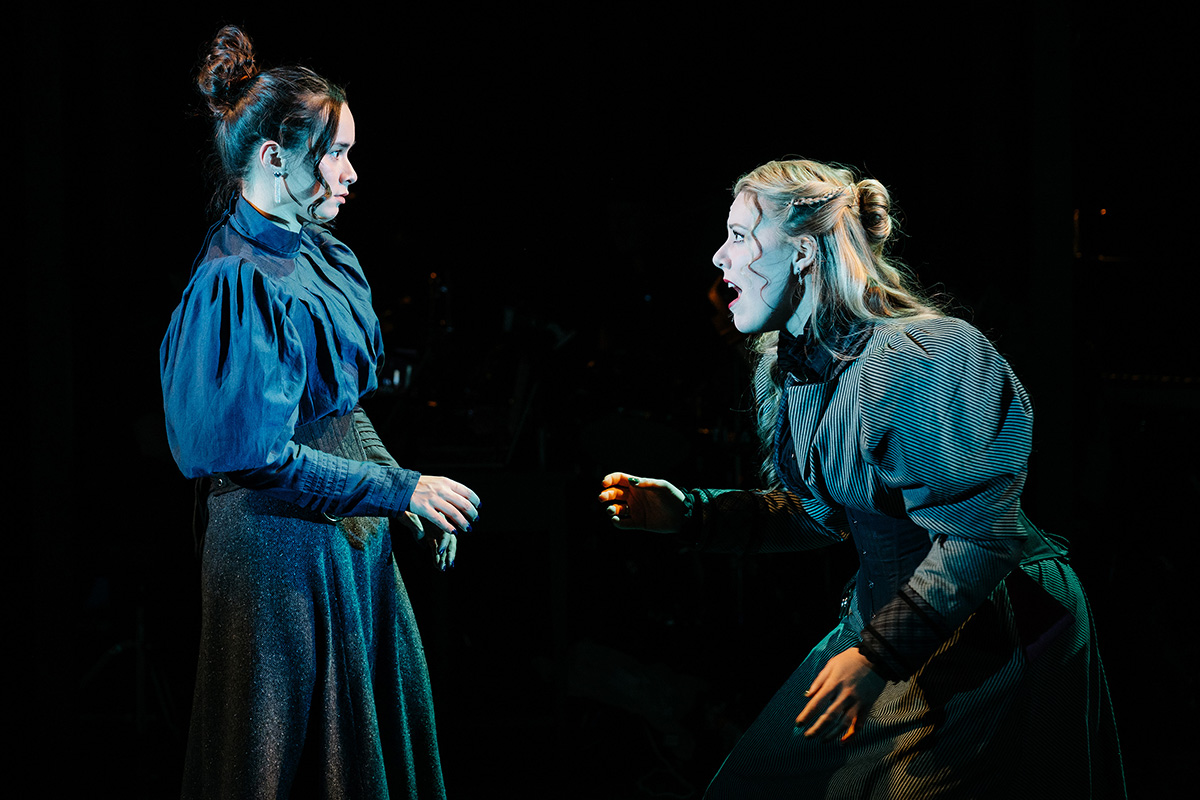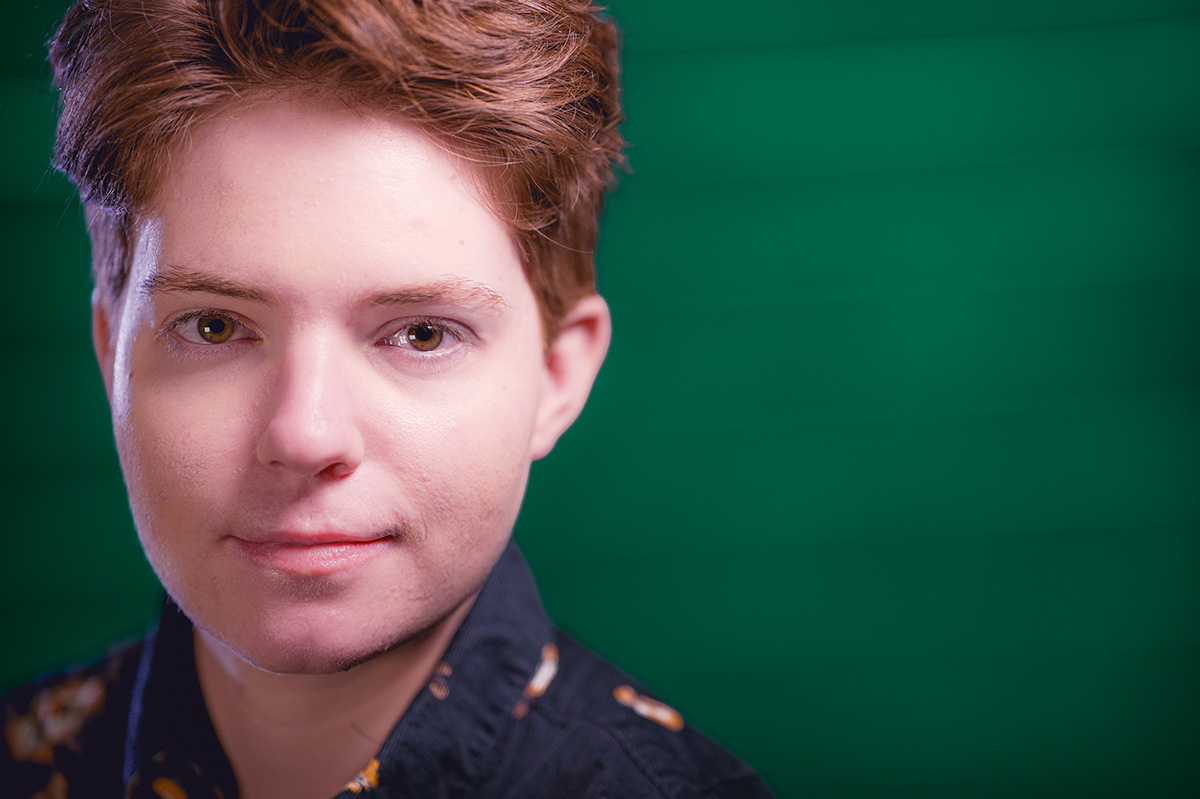Theater
Cat on a hot tin roof?
Scalia’s death inspired tweaks to ‘The Originalist’


Jade Wheeler says pondering what her character’s life might have been like helped inform her performance in ’The Originalist.’ (Photo courtesy Arena Stage)
‘The Originalist’
Through Aug. 6
Arena Stage
1101 Sixth St., S.W.
$40-90
202-488-3300
Actor Jade Wheeler shies away from political debate. But that’s offstage. As Cat, a liberal Harvard Law grad clerking for conservative Justice Antonin Scalia in John Strand’s drama “The Originalist” now at Arena Stage, it’s different. Cat is the mouthpiece for liberal politics in imagined conversations between her and the Justice as the Supreme Court prepares to hear the landmark same-sex marriage case United States v. Windsor.
“Cat is a self-defined liberal but she goes ahead and clerks for Justice Scalia even though it costs her — she loses her girlfriend and friends who can’t understand her decision,” Wheeler says. “Even though Cat disagrees with the Justice’s maddening ideology with every fiber of her being, she is impressed with his intelligence and wants to understand decisions from all vantage points.”
Young, African-American and gay, Cat chooses not to reveal her sexuality to Scalia who once famously said that he suspected he had gay friends but none who ever came out to him.
“Cat doesn’t want her colleagues to think she will be biased on Windsor and other cases related to gay rights so at work she doesn’t wear her sexuality on her sleeve,” Wheeler says. “But outside work she dates women and you might run into her at a chick bar. She has a lot of self-restraint and is sort of a chameleon in a way.”
“The Originalist” is named for Justice Scalia (here played by four-time Helen Hayes Award-winner Edward Gero) who believed the U.S. Constitution should be applied as the framers intended; it premiered at Arena Stage in 2015. Wheeler joined the cast on Election Day 2016 in Asolo Repertory Theatre in Sarasota and then travelled with the company to Pasadena Playhouse before the production came back to Washington. Since the play opened two years ago, Scalia died, Trump was elected and the country has become further divided. Some changes have been made to the script.
“Working at Arena means fulfilling a longtime goal for me,” Wheeler says. She adds it’s been very exciting for her to work with the play’s director and Arena’s Artistic Director Molly Smith and to act opposite the esteemed Gero who was her theater professor at George Mason University.
This isn’t the first time Wheeler has played a lesbian.
“There was an indie film I did in Miami where I played a lesbian,” she says. “And in life I get hit on a lot by women. I’m not gay, but I am aware of the LGBT struggle and it’s important that it’s not downplayed or forgotten.”
The playwright supplied some backstory for Cat. Still Wheeler delved deep in doing her own character development through research and asking gay friends about their lives. Then she imagined Cat’s life.
“I thought about what she’s been through at 26. How she didn’t come out to her mother who died when she was 12. How she probably came out to her father. How when she was in Cambridge studying at Harvard she probably felt it was safer to come out.”
Though maddeningly right wing, Justice Scalia was known to hire liberal clerks in real life. Strand’s script is strictly historical fiction.
“Things are simplified a little,” Wheeler says. “The characters are likable. Justice Scalia and Cat develop a mutual respect. She learns a lot from him.”
Among entries in Wheeler’s eclectic vitae is “Who is Eartha Mae?” her one-woman show about Eartha Kitt that played Off-Broadway at the 2016 United Solo Fest and won for Best Cabaret. While Kitt is mostly remembered for her sexy gold-digger nightclub persona, Wheeler opted to explore Kitt’s hardscrabble childhood in the South and her role as an activist.
“I was flabbergasted to learn that Kitt was blacklisted for protesting the Vietnam War. Her contemporaries were saying similar things but they weren’t blacklisted. She was a black woman and her voice was shutdown. After 10 years away working in Europe she was welcomed home by President Carter and her career in America reignited.”
Growing up, Wheeler lived the nomadic life of military offspring. Today the affable actor still isn’t based in any one spot but rather follows the work. She doesn’t reveal her age, because it might limit casting opportunities, and says about herself, “I, like many Americans, especially of the diaspora are mixed in some way or another. I do; however, honor my Cape Verdean heritage.”
For the record, Wheeler is an independent. Those who know her say she aligns with the left, and that’s fine with her.
“This play has taught me to argue the point but not destroy the person in front of us. Let’s talk about gun violence or privatizing jails or fracking. Let’s talk about the issue. Opposing points of view are valid. They come from life experience or an education. So I say let the facts decide the outcome rather than who can yell the loudest.”
Theater
Astounding ‘LIZZIE’ builds on legendary axe murder tale
Rock musical twist addresses abuse, oppression, queer identity

‘LIZZIE’
Through Nov. 30
Keegan Theatre
1742 Church St., N.W.
$54-$65
Keegantheatre.com
Lizzie Borden put Fall River, Mass., on the map. When the 32-year-old, seemingly respectable woman was charged with the axe murder of her father Andrew and stepmother Abby in the summer of 1892, it sent shock waves across the community and far beyond.
In time, the gruesome tale would weave its way into the annals of American crime lore, always remembered through that popular nursery rhyme “Lizzie Borden took an axe, gave her father 40 whacks…” Well, you know the rest.
The astoundingly terrific “LIZZIE” (now playing at Keegan Theatre, a short walk from Dupont Circle Metro) builds on the legend. The rock musical with book by Tim Maner, music by Steven Cheslik-deMeyer and Alan Stevens Hewitt, and lyrics by Cheslik-deMeyer and Maner, follows the days leading up to the grisly murders (unseen offstage) through Lizzie’s acquittal, bringing to the fore matters of abuse, oppression, and queer identity.
Shrewdly staged and choreographed by Jennifer J. Hopkins, the show begins with a haunting version of “Forty Whacks (Prologue),” featuring the talented cast of four women who can sing, act, move, and deliver the occasional laugh-out-loud line.
Clearly, frustrated Lizzie (powerfully played by Caroline Graham) and dominant older sister Emma (Sydne Lyon), both unmarried and still at home, are angsty and deeply unhappy. They resent their father for a litany of reasons including his extreme Yankee frugality. While one of the richest men in Fall River, he chooses to live on a sad street and go without indoor plumbing rather than set up housekeeping in posh digs across town. But it’s when they see Andrew’s great fortune slipping away to their stepmother that their fury reaches new heights.
Much of “LIZZIE” takes place at the scene of the crime, the Borden residence – cleverly suggested by scenic designer Josh Sticklin with some clapboard siding, stairways, a bit of period wallpaper and a purposely incongruous, large Borden family coat of arms.
Lighting designer Sage Green, convincingly and evocatively, summons at turns a bona fide rock concert experience, dimly lit parlor, or an intimate setting in a small yard.
And costume designer Logan Benson savvily adds to the atmosphere. Lizzie’s somber dresses with their accurate to the era leg-of-mutton sleeves give way to something altogether glitzier and more revealing after the murders.
There is dialogue, but the Riot Grrrl-inspired work is mostly sung through with punk rock anthems, ballads, and character driven songs. Whether spoken or sung, “LIZZIE” makes no bones about the title character’s guilt while introducing varying levels of collusion among the other women.
A knowing wry smirk from the house maid Bridget (Brigid Wallace Harper) says a lot about the family dynamic (“there’s a lock on every door / In every room a prisoner of a long, silent war”) as well as what went down that summer morning at the Borden house.
Lizzie’s secret girlfriend Alice (golden throated Savannah Blackwell) who conveniently lives next door, is besotted and watches her every move. Just after the murders, she saw Lizzie burn a dress in the yard.
The hard driving score is played by a passionate half-dozen strong band led by Marika Countouris. Sometimes, the instruments overpower the amplified singers and a lyric or two is lost, but that’s not so unusual with rock musicals.
At 90 minutes with a leisurely intermission (well-earned by the band and cast, especially Graham as Lizzie who’s onstage throughout, often incorporating frenetic movement and strenuous air guitar into her many songs), the first half explores feelings of entrapment and the second liberation.
Lizzie goes to trial. Despite a shaky alibi, the defendant seems to be winning over the jury. Looks like she might get that grand house on the hill after all.
The Borden story has been shared in varied ways including innumerable books and documentaries, Jack Beeson’s opera “Lizzie Borden” (1965), Agnes de Mille’s ballet “Fall River Legend” (1954), and the memorable 1975 TV movie starring Elizabeth Montgomery (best known as the perky reluctant witch Samantha Stevens on TV’s sitcom “Bewitched”) playing against type.
Today, the legend endures with “LIZZIE” at Keegan.
Theater
Reggie White explores the many definitions of home in ‘Fremont Ave.’
‘Music and humor set against the rhythm of a cutthroat game of spades’

‘Fremont Ave.’
Through Nov. 23
Arena Stage
1101 Sixth St., S.W.
Tickets start at $49
Arenastage.org
For Reggie D. White, growing up Black and queer in the late 1980s and early ‘90s, there wasn’t a lot of vocabulary for his experience outside of the AIDS crisis. Despite being surrounded by family who loved him, White felt isolated in his own home; there was a sort of membrane that prevented him from being present.
With his new play “Fremont Ave.,” now running at Arena Stage, White has written a work about home and the many definitions of that idea specifically relating to three generations of Black men.
Set in a house on a street in a Southern California suburb (similar to where White grew up), “Fremont Ave.” explores the ways a lack of belonging can be passed down generationally. The first act is boy meets girl and creating a home; and the second watches the next generation struggling to achieve something different.
“The third act’s storyline is deeply queer,” White explains. “Boyfriends Joseph and Damon have been together for years yet can’t figure out what it means to make a home. We don’t totally see the relationship solved, but there’s a glimmer of hope that it just might make it.”
The playwright notes, it’s not all about familial angst and alienation: “Much of the play is music and humor set against the rhythm of a cutthroat game of spades.”
Playwright, actor, and educator, White “does all the things.” Currently, he holds the title of Arena’s senior director of artistic strategy & impact, a role focused on artistic vision and growth. Superbly energetic, White splits his time between Arena and his prized rent-stabilized residence in Brooklyn’s desirable Park Slope neighborhood. He’s already told his landlord that he’s never leaving.
At seven, he came close to landing the part of young Simba in the pre-Broadway “Lion King.” Soured by the near miss, White turned his attention to sports and studies. In his freshman year at college in the Bay Area, he took a musical theater class for the heck of it, and soon gave up law school ambitions to focus on show biz. He went on to appear in Matthew López’s Broadway success “The Inheritance” until the pandemic hit.
Winning the Colman Domingo Award in 2021 gave White the flexibility to write “Fremont Ave.” (The award is given to a Black male or male-identifying theater artist and includes a cash stipend and development opportunities.)
“It can be scary to make a career in the arts. I ran from it for a long time. Then one morning I just woke up very grateful for the accumulation of accidental circumstances that landed me in this moment.”
WASHINGTON BLADE: Is queerness your secret to success?
REGGIE D. WHITE: I’m not saying that being queer is my mutant super power, but I do think there is an element of living my life on the margins trying to find a place for myself that I’ve been able to observe relationships and how people engage and interact with each other that gives me a real objective eye on how to render a world that I didn’t live in.
BLADE: What’s queer about your work?
WHITE: There’s this thing that James Baldwin said a lot, it’s about being on the outside of an experience, being able to observe more astutely. With “Fremont Ave.” it felt important to me that the actor leading us through is played by a queer actor. I wanted that authenticity and that experience of having felt isolation.
It’s unique that the central man in each story, the grandfather, stepson, and grandson are played by the same queer actor Bradley Gibson, that amazing TV star with the big muscles.
It’s also interesting to watch a single body traverse over generations in the same house (altered over time by appliance and art updates).
BLADE: Premiering your play as part of Arena’s 75th anniversary season must be a thrill.
WHITE: Sometimes I ask myself, how is this happening? And I didn’t even have to sleep with anybody. But seriously, I’m lucky. Arena excels at taking great care of world premieres, and the production’s director Lili-Anne Brown has a visceral sense of how to create community and life on stage.
BLADE: What else is unique about “Fremont Ave.”?
WHITE: Men aren’t a particularly emotionally literate species, so there haven’t been a lot of plays exploring the emotional condition of men and what it means to learn to love.
For men, love looks like silence. I wanted to explore what it looks like when there’s a deep curiosity about the people we’ve known and loved.
BLADE: Was risk involved?
WHITE: I wrote a deeply personal play. That’s scary. So, to see everyone involved invest their own love into what’s my play, that’s incredible, and a great confirmation of “specificity is the key to universality.” People seeing themselves in the characters has been both beautiful and surprising.
Theater
Set designer August Henney puts new spin on Mary Shelley’s life
‘So Late Into the Night’ an ideal fall show at Rorschach

‘So Late Into the Night’
Through Nov. 2
Rorschach Theatre
The Stacks @ Buzzard Point
101 V St., S.W.
Spooky Action Theater
Washington, D.C.
Tickets start at $74
Rorshachtheatre.com
We’ve all been to that scary party or two. But ordinarily, it’s not by choice.
But with playwright Shawn Northrip’s So Late Into the Night, the spookiness is planned, executed, and fun. Northrip lays out the story of novelist Mary Wollstonecraft Shelley, famed author of the gothic masterpiece Frankenstein, and in gathering her Romantic poet friends and lovers, investigates their afterlife.
What’s more, the new play, which also features a rock séance, is performed in the Stacks at D.C.’s Buzzard Point neighborhood, a unique neighborhood positioned where the Potomac and Anacostia Rivers meet, just south of Audi Field.
At the Stacks, Rorschach is activating a high-ceilinged corner retail that serves as the company’s fall home base. Inside the cavernous space, the production’s set designer August Henney is putting a new spin on Newstead Abbey, the grand home of Lord Byron, a friend of Shelley. Included in the new look are a Victorian dining table (33 by 12 feet), grand drapes, and modern rock and roll posters. Audience members can sit at the table or the risers on the perimeter.
Henney, who identifies as a trans gay man, is a Bay Area transplant who arrived in D.C. three years ago to study scenic design at the University of Maryland. The experience has been transformational.
WASHINGTON BLADE: How do you pursue concept before realizing a set?
AUGUST HENNEY: At first, I go through the script and take out words that spark inspiration. I’m very much a words person – I find words and then relatable images. Next, I create a collage and present it to the director.
BLADE: Along the way, does the director exert control?
HENNEY: Oh yes. It’s hopefully conversation, but they have the final say about everything. If it’s very important to me or I think it’s very important to the show, I’ll fight for it.
BLADE: When the show kicks off does your vision typically come to fruition.
HENNEY: That depends entirely on the technical director. I do the drafting and present it to the tech director. Lays out how to do that. Like an engineer and architect. This is how I want the façade to look but I don’t care so much about the insides. Comes down to what we can and can’t do. Usually comes down to cost.
BLADE: How much was learned in life and now much at school?
HENNEY: At school, I came in not knowing much. UMD cleverly matched us up with a cohort who has different skills from you. They do that well. So, there were endless hours in the hallways of the grad school where we’d build models until 3 a.m. working and blasting music. I also learned from my father who is adept at wood working, and jobs in prop shops.
BLADE: How was your coming out as a trans gay man?
Henney: Well grad school really helped with that. I believe the universe puts people in places. And with UMD, it put me in the right place. At undergrad, I got another degree in human physiology and thought I wanted to be a doctor for a second. My path would have been very different.
Scenic design placed me in range of the right people who helped me realize things about myself that I didn’t have to keep hiding. Theater is such an inclusive community already and I feel safe here while the world is so unsafe.
BLADE: This morning, I heard the administration was blaming the government shutdown on trans people. Does that kind of madness get you angry?
HENNEY: Angry, frustrated, and despondent. I get through the days by focusing on the good bits, and the people who make me feel like myself. That’s all you can really hope for in a world that’s falling apart.
BLADE: Yet, the show goes on.
HENNEY: Oh yes, and So Late Into the Night is a wonderful show. It pairs with some of the best things in the world like spooky ghost stories and dramatic rock music in autumn, the perfect season. It’s a show where audience members can feasibly be seated next to Mary Shelley and friends at a big dining table on Halloween night. How great is that?



















